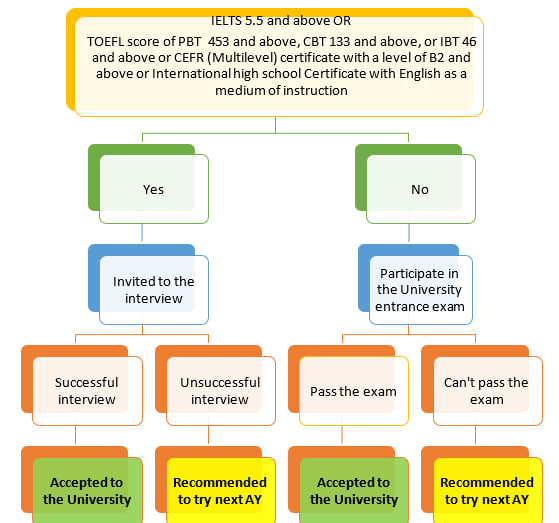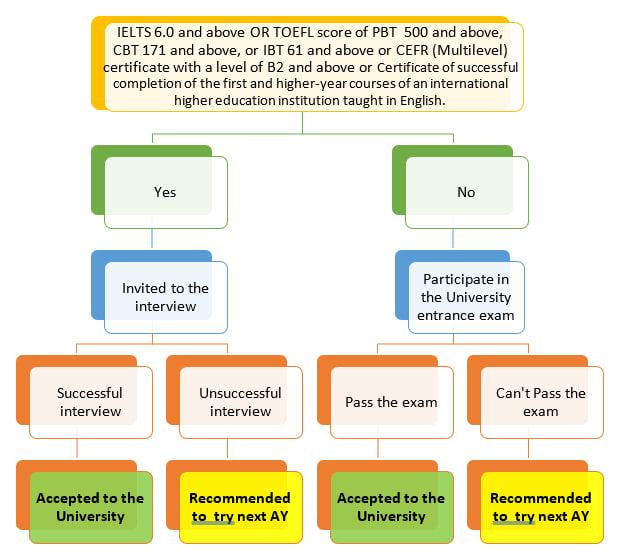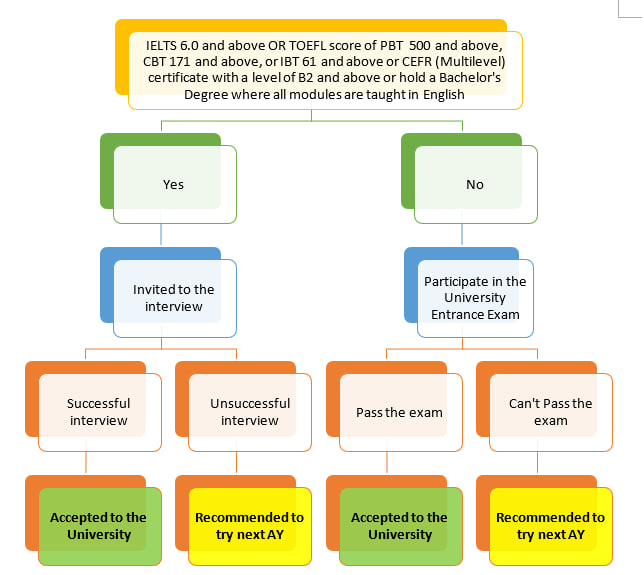Central Asian University of Environmental and Climate Change Studies (Green University) –
Admission procedure for 2025-2026 Academic Year
I. FOUNDATION YEAR
Admission Period: April 15, 2025 – August 29, 2025 (included)
- The foundation year is a full-time program that can be completed within a period of one year. It consists of 6 modules, 3 modules per semester. All modules of Foundation Year in 2025-2026 are taught only in English.
The main purpose of the program:
- Provide a flexibly structured program of study to improve English language skills and communication skills together with soft skills;
- Provide a sound knowledge base in environment studies and introduce fundamental environment concepts;
- Encourage the development of a creative attitude, an open mind, and ecology-relevant awareness.
Specific program outcomes:
The program provides opportunities for participants to develop and demonstrate knowledge and skills in the following areas:
- English language skills, communication skills, soft skills, and basic environment concepts;
- To cultivate an interest in Environment Management, Environment Protection, and Sustainability;
- To equip participants with the ability to apply knowledge in practice.
- Applicants must meet the following minimum requirements:
- Must be graduates of a Secondary School/Academic Lyceum/Professional College (11 years of compulsory education).
- Must hold an IELTS Certificate with a score of 5.5 and above,
OR TOEFL score of PBT-453 and above, CBT-133 and above, or IBT-46 and above
OR CEFR (Multilevel) certificate with a level of B2 and above
OR International high school successful graduate Certificate with English as a medium of instruction.
OR pass the University Entrance Exam.
- Those who hold an appropriate English language proficiency certificate must write and upload a personal statement (250-300 words) on the topic “Which of the three bachelor’s programs of Green University are you going to choose and why?” They will then be invited to the interview.
- Those who do not hold an appropriate English language proficiency certificate must participate in the University Entrance Exam, which is similar to the IELTS/CEFR format, covering (Listening, Reading, Writing, and Speaking) sections and includes topics related to the environment, ecology, climate change, etc.

II. DIRECT ENTRY – TRANSFER – to undergraduate program
Admission Period: April 15, 2025 – August 29, 2025 (included)
-
- Direct Entry – Transfer to undergraduate program is the level at which the candidates can apply for the second year of the study (Y1) of the University’s Bachelor’s degree. All modules of the Bachelor’s Degree in 2025-2026 are taught only in English.
- The list of Bachelor’s Degree programs
- BSc (Hons) Environmental and Sustainable Management.
- BSc (Hons) Environment and Economics.
- BSc (Hons) Ecology and Public Administration.
Upcoming Programs (subject to change):
- BSc (Hons) Environmental Engineering and Renewable Energy
- BSc (Hons) Sustainable Tourism and Ecotourism Management
- Applicants must meet the following minimum requirements:
- Successful completion of the first or any above years of studies at higher educational institutions in Uzbekistan
OR Successful completion of Foundation or any above years of studies at international Universities;
OR Successful completion of Technical College (Level 5).
- IELTS certificate with an overall score of 6.0;
OR TOEFL score of PBT 500 and above, CBT 171 and above, or IBT 61 and above;
OR CEFR (Multilevel) certificate with a level of B2 and above
OR pass the University Entrance Exam.
English language requirement can be waived under the following conditions upon the University Admission Committee’s approval:
- A degree awarded by accredited universities in English-speaking countries, where the whole program was taught and assessed in the English Language.
- A degree awarded by an accredited university in non-English-speaking countries where the whole program was taught and assessed in English (with a medium of instruction letter provided).
- Those who hold an appropriate English language proficiency certificate must write and upload a personal statement (350-400 words) on the topic “Discuss how earning a degree from Green University will prepare you to make an impact and achieve your goals in this sector?” and will be invited to the interview.
- Those who do not hold an appropriate English language proficiency certificate must participate in the University entrance exam, which is similar to the IELTS/CEFR format, covering (Listening, Reading, Writing, and Speaking) sections. The exam covers topics related to the environment, ecology, climate change

III. MASTER’S DEGREE
Admission Period: April 15, 2025 – August 29, 2025 (included)
- Master’s Degree is a day program that can be completed within a period of two years. The number of modules varies in each master’s program. All modules of the Master’s Degree in 2025-2026 are taught only in English.
The main purpose of the program:
- Help participants to become capable and competent specialists and managers in a range of organisations operating within an increasingly international setting;
- Provide a sound knowledge base in environmental studies such as environmental law and Journalism;
- Promote the growth of an innovative mindset, an open mind, and awareness in the areas of Sustainable Development and Finance.
- Applicants can apply to the following postgraduate programs in 2025-2026 AY:
- MSc Sustainable Development
- MSc Sustainable Finance
- MSc Environmental Law
- MSc Environmental Communication
Upcoming programs (subject to change):
- MSc Nature Conservation
- MSc Sustainable Tourism
- MSc Circular Economy
- MSc Hydrometeorology and Water Management
- MSc Sustainable Urbanization
- MSc Climate Resilience Forestry and afforestation
- Applicants must meet the following minimum requirements:
- Must have UK equivalent Bachelor’s Degree in any subject area with a GPA of 2.5 or UK 2.2;
- Must have an IELTS certificate with an overall score of 6.0
OR TOEFL score of PBT 500 and above, CBT 171 and above, or IBT 61 and above
OR CEFR (Multilevel) certificate with a level of B2 and above
OR Pass the University Entrance Exam.
English language requirement can be waived under the following conditions upon the University Admission Committee’s approval:
- A degree awarded by an accredited university in English-speaking countries where the whole program is taught and assessed in the English language;
- A degree awarded by an accredited university in non- English-speaking countries where the whole program is taught and assessed in the English language (with a medium of instruction letter provided);
- Those who hold an appropriate English language proficiency certificate must write and upload a personal statement (500-700 words) on the topic on one of the below topics and will be invited to the interview:
- How would you evaluate the environmental challenges in Central Asia?
- How can you contribute to the future of environmental sustainability in our country?
Those who do not hold an appropriate English language proficiency certificate participate in the University entrance exam, which is similar to the IELTS/CEFR format, covering (Listening, Reading, Writing, and Speaking) sections. The exam covers topics related to the environment, ecology, climate change, etc.

 English
English

